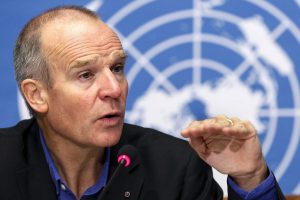
Chris Dye
University of Oxford
UK
22nd EMBL Science and Society Conference
EMBL is committed to sharing research advances and sustaining scientific interaction throughout the coronavirus pandemic. We are delighted to announce that the conference is going virtual and invite you to join us online.
This conference will be virtual and free to all attendees.
The One Health movement, which has come to prominence in the last decade, advocates greater cross-sectoral collaboration and communication across the human-animal-environment interface. There has been a long-standing recognition that population health is intrinsically linked to both animal and environmental health, and that issues such as population growth, changes in climate and land use, and the movement of animals and people, have a huge impact on the collective health of our world today.
But the One Health concept takes this much further. By designing and implementing programmes, policies, legislation and multidisciplinary research, it seeks to deliver the best possible public health outcomes on a global scale. This has become increasingly urgent, as many of these changes have occurred in our very recent history: through the prevalence of deforestation and intensive farming, with the increase in forced migration due to climate change, or simply through modern methods of travel and trade (which allow diseases to spread quickly across the globe).
One Health is a “collaborative, multisectoral, and transdisciplinary approach—working at the local, regional, national, and global levels—with the goal of achieving optimal health outcomes by recognising the interconnection between people, animals, plants, and their shared environment”[1]. This synergistic concept has enormous potential to not only impact some of the biggest public health challenges of our time, from antimicrobial resistance, pandemic preparedness, to food safety and biosecurity – but also wider planetary health.
The 2021 Science & Society Conference will examine the potential societal benefits of the multifaceted One Health methodology, analyse how successful it has been to-date, determine whether One Health could be the key to future pandemic prevention, and ascertain what steps are needed to accelerate implementation. It will explore whether the interpretation of One Health has been biased towards an anthropocentric view of “health”, and it will also seek to answer the question: will something as far-reaching as the COVID-19 pandemic be the catalyst needed to finally make the aspirational goals of One Health a reality?
[1] https://www.cdc.gov/onehealth/index.html
For more information about previous meetings in this series please check the Science and Society Website.
“A scientist must find time to step away from the lab table and question scientific practices more broadly. Without conferences like these, we would lack a forum to do so and would be blind toward potential improvements.” – Joshua Yudice, Brandenburg University of Technology, Germany
“The event was greatly organized and very interesting. All the speakers’ presentations were outstanding and the discussions very stimulating. I loved the possibility to talk to the speakers during the social moments.” – Anna Sofia Tascini, IRCCS Ospedale San Raffaele, Italy

University of Oxford
UK
Chris Dye first trained as a biologist and ecologist (BA York) but postgraduate research on mosquitoes (DPhil Oxford) led to a career in epidemiology and public health. As WHO Director of Strategy 2014-18, he served as science advisor to the Director General, oversaw the production and dissemination of health information by WHO press and libraries, and coordinated WHO’s work on health and the Sustainable Development Goals. During the early stages of the COVID-19 pandemic he was editor of “Coronavirus: The Science Explained”, a website hosted by UK Research & Innovation that presented science simply for the public. He has advised the UK government on COVID-19, and collaborated on coronavirus research in Brazil, China and across Europe. He is Professor of Epidemiology at Oxford University, and a Fellow of The Royal Society, the Academy of Medical Sciences and the Royal Society of Biology. His most recent book is, “The Great Health Dilemma: Is Prevention Better than Cure?” (OUP 2021, bit.ly/33ZfOKV).
“Multidisciplinary” is a watchword for the age of sustainable development. Working collaboratively across sectors and disciplines is seen as vital to achieving the United Nations Sustainable Development Goals (SDGs) by 2030, but has proved difficult to do in practice. In this talk I will describe some of the challenges in making progress towards the SDGs, seen from the perspective of One Health. I will explore problems including antimicrobial resistance, neglected tropical diseases and zoonoses, pandemics and climate change, where solutions depend on understanding the connections between humans, animals and the environment. Putting the idea of One Health into practice has profound implications for proposing and testing scientific ideas, in ways that are uncomfortable for specialists in a range of disciplines.
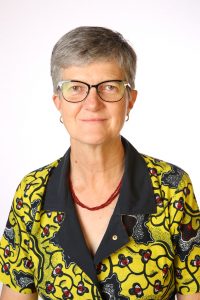
Australian National University / Chatham House
UK
Robyn Alders AO is an Honorary Professor with the Development Policy Centre within the Australian National University, a Senior Consulting Fellow with the Chatham House Centre for Universal Health, and an Adjunct Professor in the Veterinary Department of Infectious Disease and Global Health, Tufts University. Her applied research focuses on sustainable livestock production in support of food and nutrition security through a Planetary Health lens. Robyn also consults to the Food and Agriculture Organization and the International Fund for Agricultural Development.
In May 2002, Robyn was the recipient of the Kesteven Medal, awarded by the Australian Veterinary Association and the Australian College of Veterinary Scientists in recognition of distinguished contributions to international veterinary science in the field of technical and scientific assistance to developing countries. In January 2011, she was invested as an Officer of the Order of Australia by the Governor General of Australia for distinguished service to veterinary science as a researcher and educator, to the maintenance of food security in developing countries through livestock management and disease control programs. In February 2017, Robyn was the recipient of the Inaugural Mitchell Global Humanitarian Award which recognises Australians and others supported by Australian aid who have made an outstanding contribution to the cause of international development.
Human society, as we know it, rests on access to safe and nutritious food. Yet, even prior to the COVID-19 pandemic, over 10 percent of people globally were undernourished and approximately 30 per cent deficient in key micronutrients. In addition, the Intergovernmental Panel on Climate Change states that observed climate change is already affecting food safety and security through increasing temperatures, changing precipitation patterns, and greater frequency of extreme weather events.
Sustainable and circular bioeconomy systems for food, together with fair global trade, are being promoted as mechanisms that can contribute positively to reductions in associated greenhouse gas emissions and improved nutrition security. Agricultural, medical and biomedical professionals, amongst others, must work together seamlessly under a One Health banner to achieve optimal health outcomes for all. Molecular biology research and development has a crucial role to play across a wide spectrum of food system-related endeavours, including: i) identifying ‘good’ and ‘bad’ foodborne microbes and the conditions that enable them to flourish; ii) confirming the geographical origin of foods; iii) understanding molecular interactions that facilitate the optimal utilization of key nutrients by microbes, plants, animals and people; and iv) identifying biomarkers for resilience in plant and animal species that are key components of sustainable food systems.
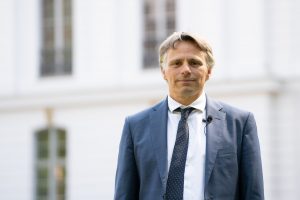
Helmholtz Institute for One Health
Germany
Prof. Dr. Fabian Leendertz is the founding director of the Helmholtz Institute for One Health in Greifswald and Professor for One Health at the University of Greifswald. Fabian is a veterinarian by training and specialised on zoonotic diseases, especially in areas with high biodiversity and risk of pathogen transmission. His work was published in numerous publications and covered broadly by the media. Lately he received the “champions of the earth award” in the category research and innovation by the United Nations Environmental Programm (UNEP).
In my talk I will give an overview on innovative methods used to study wildlife-borne zoonoses within a One Health framework. The focus will be on our work in tropical rainforest areas where we are working in close partnership with our African partners as well as colleagues from various disciplines since many years.
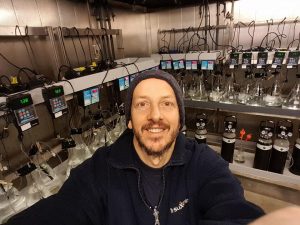
University of Gothenburg
Sweden
Sam Dupont is an associate professor and senior lecturer in Marine Eco-Physiology at the University of Gothenburg. His main research topic is on the effect of global changes (e.g. ocean acidification, warming) on marine ecosystems. His work aims at revealing the mechanisms behind species and ecosystem responses (physiology, ecology, evolution) to environmental changes and at developing the needed unifying theory for large-scale projections. He was published in more than 185 publications in journals including Nature, PNAS and TREE. He is a member of the Advisory Board of the Ocean Acidification International Coordination Centre (OA-ICC), the Executive Council of the Global Ocean Acidification Observing Network (GOA-ON) and is an author for high-level policy documents such as the IPCC report. He is also working on the development of innovative science communication and education strategies. The third aspect of his work aims at evaluating, teaching and building capacities for marine science in developing countries
The COVID-19 pandemic reminds us that our health is vulnerable to immediate threats emerging from the ecosystems we inhabit. As the largest connected ecosystem on Earth, the Ocean exerts a greater influence than any other on our climate and weather, but also affecting global food production and international trade. Much more importantly, human health is intricately linked to Ocean health.
In this presentation, I will illustrate the complexity of this intricate relationship between the Ocean and Human health and summarize recommendations for future work. Three key areas were identified by the project Horizon 2020 SOPHIE Project where interdisciplinary teams from the Ocean and Human Health community can push forward innovative actions with diverse multilevel stakeholders to respond to current and future circumstances: (i) sustainable seafood for healthy people; (ii) biodiversity, biotechnology, and medicine; and (iii) blue spaces, tourism, and well-being.
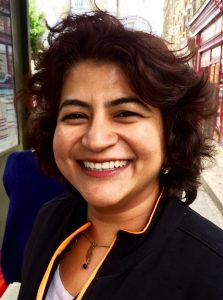
Center for Disease Dynamics, Economics & Policy
India
Jyoti Joshi MBBS MD (Community Medicine) & MSc (Infectious diseases) is Head – South Asia at the Center for Disease Dynamics, Economics & Policy (CDDEP) and an Adjunct Professor at Amity Institute of Public Health, Amity University, Uttar Pradesh, India.
A medical doctor with specialization in Community Medicine and Infectious diseases. Dr Joshi has worked in public health programs for two decades and her research interests include antimicrobial resistance (AMR), health systems; vaccines especially vaccine safety; and emerging infectious diseases. As part of the Global Antibiotic Research Partnership (GARP) project at CDDEP, Dr Jyoti supported country working groups in 6 Asian countries (India, Pakistan, Nepal, Bangladesh, Laos PDR and Vietnam) to develop AMR Situation Analyses to address AMR. She leads the work of the World Health Organisation (WHO) Collaborating Centre on AMR at CDDEP’s New Delhi office and has also worked with WHO to undertake country case studies to assess entry points for integrating AMR activities. This work facilitated the global guidance for taking National Action Plans for AMR from paper to action by integrating AMR sensitive and AMR specific approaches within existing health programs. The Scoping Report on the antimicrobial resistance research landscape in India, co-authored by Dr Joshi led to landmark projects in AMR in India, including those which she leads.
Antimicrobial resistance (AMR) is a natural process accelerated by several factors including inappropriate prescribing, poor infection control practice, and excessive use of antimicrobials in humans and agriculture (including animal farming). Human health and the health of our planet are inextricably linked and flourishing natural systems and the wise stewardship of public goods like antibiotics is key to address AMR. Excessive inappropriate antibiotic use in the community and hospitals; intensive agricultural practices as wel as antibiotic containing discharge from hospitals, pharma manufacturing plants, poultry and cattle farms and even our homes, highlight the One Health threat of AMR. Using the case study approach, the talk will highlight the One Health challenges for mitigating AMR in the human, animal and environment sector in India. India is a “pharmacy for the world” but also one of the largest consumer of antibiotics due to the high burden of bacterial infections, limited universal health coverage, shortage of health workers. Since the launch of the National Action Plan on Antimicrobial Resistance (NAP-AMR) in 2017, several states have announced State Action Plans, the national AMR surveillance network has been established and draft environment standards for pharma effluent announced. The One Health approach however demands effective coordination and accountability from each of the sectors to enable an effective and sustainable way to ensure AMR sensitive and AMR specific lens in sectoral interventions.

Finnish Environment Institute (SYKE)
Finland
Eeva Furman is director of the Environmental Policy Center at Finnish Environment Institute (www.syke.fi). Her background is in marine biology, and the last twenty years she has been working on issues linked to environmental governance, biodiversity governance, sustainable development and planetary health. Her core interest is science-policy-society, co-creation of sustainability transformations as well as active citizenship. She has strong international networks and engages actively with science and society. She co-authored The Global Sustainable Development Report (GSDR) with 14 other scientists – the report was handed to the heads of UN’s member states in the general assembly held in September, 2019. She has been chairing Finland´s expert panel on sustainable development since 2016.
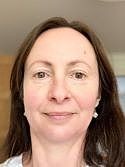
Nature Microbiology
UK
Susan studied Microbiology & Virology for her undergraduate degree at the University of Warwick. She received a PhD in Microbiology, studying quorum sensing in a plant pathogenic bacterium in George Salmond’s lab at the University of Warwick. After postdoctoral work at Imperial College, London investigating transcriptional mechanisms underlying stress responses in bacteria, she left the lab in 2003 to join the launch team of Nature Reviews Microbiology, becoming Chief Editor in 2008. She moved to join the PLOS Medicine team in 2009 where she was responsible for infectious disease, public health and molecular medicine and became Senior Research Editor in 2011. Susan joined Nature Biotechnology in 2012 where she spent eight years as Senior Editor, and was responsible for applied microbiology, microbiome technologies, microbial genomics and plant biotechnology among other areas. She joined Nature Microbiology as Chief Editor in March 2020.
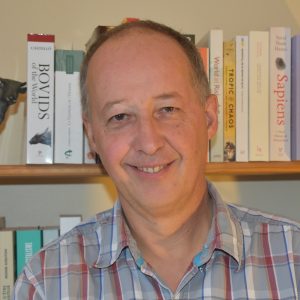
Research Director at CNRS / CIRAD
Thailand
With a strong background in evolutionary ecology of disease transmission, I focus my research on health ecology. Field disease ecologist, I am concerned at the role of biodiversity as risks but insurance for zoonotic emerging infectious diseases and antimicrobial resistance raise. During the last 10 years I conducted 35 field trips in Southeast Asia (Thailand, Cambodia, Laos, Vietnam, Philippines) totalling more than 380 days of field works. I have conducted several projects on the impacts of global changes, including climate and land use changes, on the links between biodiversity, health and societies in Southeast Asia, using wildlife-borne diseases as a model (projects ANR CERoPath and ANR BiodivHealthSEA. The new ongoing project, ANR FutureHealthSEA aims at building scenarios of health and biodiversity in links with land use changes and governance. I have published articles, edited special issues and books on this topic, with the last ones “Socio-ecological Dimensions of Infectious Diseases in Southeast Asia” (2015 Springer Singapore), “Biodiversity Conservation in Southeast Asia: Challenges in a Changing Environment” (2017 EarthScan London), and “Biodiversity and Health. Linking Life, Ecosystems and Societies” (2017, ISTE-Elsevier, London) (see https://www.researchgate.net/profile/Serge_Morand). I belong to the French CNRS and CIRAD, based in Thailand at the Faculty of Veterinary Technology (Kasetsart University), and invited Professor at the Faculty of Tropical Medicine (Mahidol University).
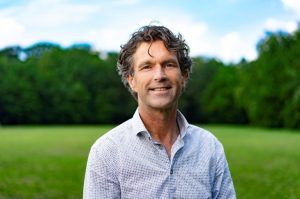
Utrecht University
The Netherlands
Arjan Stegeman is full professor of Farm Animal Health and Epidemiology of Infectious Diseases at Utrecht University, The Netherlands. He is a veterinarian by training and a diplomate of the European College of Veterinary Public Health. His research is focused on the epidemiology of infectious diseases in farmed animals aiming to unravel the mechanisms that determine the population dynamics of infections and establish the effectiveness of intervention measures. For that goal his group applies animal experiments, field studies and mathematical modelling. Arjan is chair of the Dutch expert group on animal diseases and vice-chair of the outbreak management team zoonotic diseases.
Got something to say? Tweet it! #SciSoc2021
All times in the programme below are shown as the time in Europe/Berlin.
To find out the equivalent time zone in your location, enter Berlin, the programme time and date along with your city into the Time Zone Converter.
This programme is preliminary and is subject to change. All talks will be live streamed and available on-demand after the event in the conference platform.
| Time | Session |
|---|---|
| 09:30 – 09:50 | Opening session |
| 09:30 – 09:40 | Conference format and housekeeping Lucia von Bredow – EMBL Heidelberg, Germany |
| 09:40 – 09:50 | Welcome note Edith Heard – EMBL Heidelberg, Germany |
| 09:50 – 10:30 | Keynote talk: From antibiotics to zoonoses: Can One Health achieve many development goals? Chris Dye – University of Oxford, UK (Livestreamed and available on-demand after the conference) |
| 10:30 – 11:40 | Virtual Session 1 Examining the many facets of One Health Chair: Lucia von Bredow – EMBL Heidelberg, Germany |
| 10:30 – 10:50 | Ocean & Human Health Sam Dupont – University of Gothenburg, Sweden (Livestreamed and available on-demand after the conference) |
| 10:50 – 11:10 | One Health and Sustainable Food Safety, Security and Systems Robyn Alders – Australian National University, Canberra, Australia / Chatham House, UK (Livestreamed and available on-demand after the conference) |
| 11:10 – 11:40 | Virtual session 1 Q&A What is the breadth and remit of One Health? |
| 11:45 – 12:05 | Meet the keynote speaker and speakers of Session 1 (Chris Dye, Sam Dupont, Robyn Alders) |
| 12:05 – 12:20 | Address by Dame Sally Davies, UK Special Envoy on AMR, available to conference participants only (Simulive and available on-demand after the conference) |
| 12:20 – 12:50 | Networking lunch break |
| 12:50 – 13:00 | Break / Transition to next session |
| 13:00 – 14:10 | Virtual Session 2 One Health in action: Local to global Chair: Matthias Hentze – EMBL Heidelberg, Germany |
| 13:00 – 13:20 | Combating Antimicrobial Resistance (AMR): A One health challenge in India Jyoti Joshi – Center for Disease Dynamics, Economics & Policy, India (Livestreamed and available on-demand after the conference) |
| 13:20 – 13:40 | Emerging Zoonoses in Africa & beyond: A One Health perspective Fabian Leendertz – Helmholtz-Institute for One Health, Germany (Livestreamed and available on-demand after the conference) |
| 13:40 – 14:10 | Virtual session 2 Q&A What can the West learn from the global picture? |
| 14:15 – 14:35 | Meet the speakers of Session 2 (Jyoti Joshi, Fabian Leendertz) |
| 14:35 – 14:40 | Break / Transition to next session |
| 14:40 – 16:10 | Roundtable on harnessing the potential of One Health Chair: Zamin Iqbal – EMBL-EBI Hinxton, UK Speakers: Eeva Furman – Finnish Environment Institute (SYKE), Finland Susan Jones – Nature Microbiology, UK Serge Morand – Research Director at CNRS / CIRAD, Faculty Veterinary Technology, Thailand Arjan Stegeman – Utrecht University, The Netherlands (Livestreamed and available on-demand after the conference) |
| 16:10 – 16:20 | Closing remarks Lucia von Bredow – EMBL Heidelberg, Germany |
| 16:20 – 17:20 | Post conference networking |
This conference will be virtual and free to all attendees. For this reason we invite you to register only if you are certain you will attend the event and to use the cancellation option should you register but realise that you cannot attend in the end. Registration system supports additional registrations.
Note for teachers registering multiple students: Please contact us by email to receive a separate link for registering students and yourself. By signing up to this platform, you hereby confirm that you, your students and/or their legal guardians consent that their data will be processed by EMBL, which is an international organisation, as defined in Art. 4 Nr.26 GDPR.
If you have any doubts, please contact us by email. For further information please refer to the FAQ page.
Please do:
Please don’t:
Additional information can be found in our Code of Conduct.
It is important to stay healthy and move around, especially when you are attending an event virtually. We have put together a few coffee break stretches and yoga videos. You can find these under ‘resources’ on the conference platform.
Please use the Q&A function. It is possible to send a direct message to participants, poster presenters, and speakers within the conference platform.
If you have any other questions, you can go to the Help Desk on the conference platform. Click on ‘more’ on the top menu and click Help Desk.
The programme is planned based on Central European Time (CET) or Central European Summer Time (CEST) unless otherwise stated. As many virtual participants are attending from around the world, we do our best to accommodate as many timezones as possible when creating the programme. Please take your time zone into consideration when planning your attendance. Remember to set your time zone in your account.
We are using a virtual event platform for this conference. More information about the platform will be shared ahead of the conference.
EMBO reports, an EMBO Press journal
Date: 3 Dec 2021
Location: Virtual
Deadline(s):
Registration: Closed
Organisers:
Contact: Iva Gavran